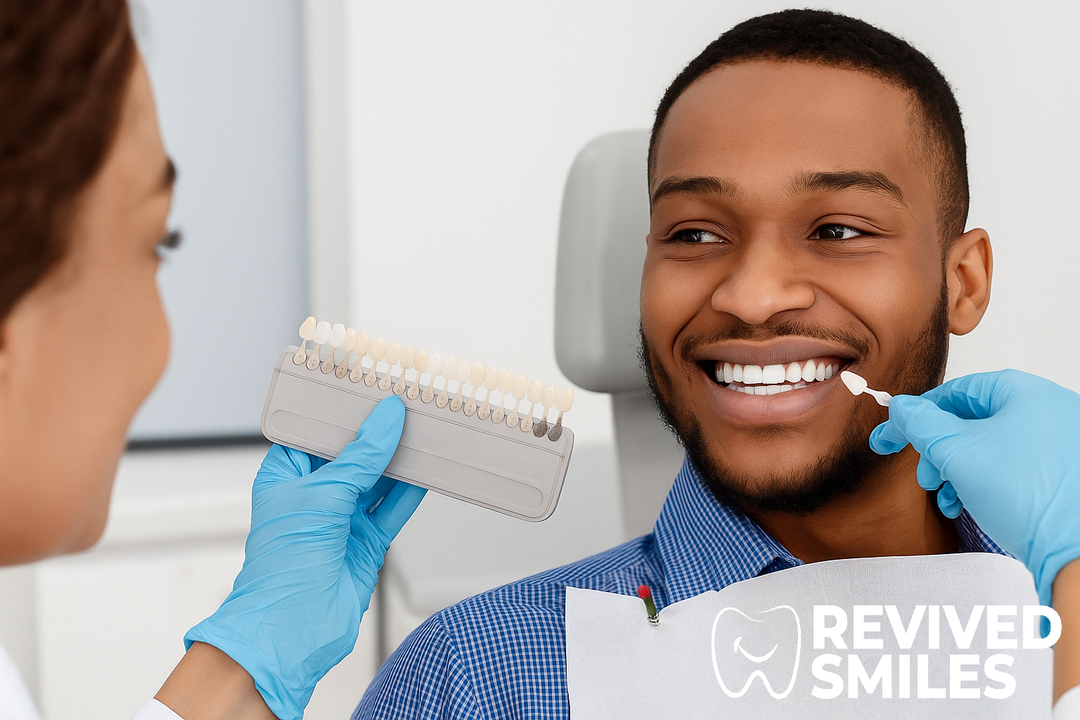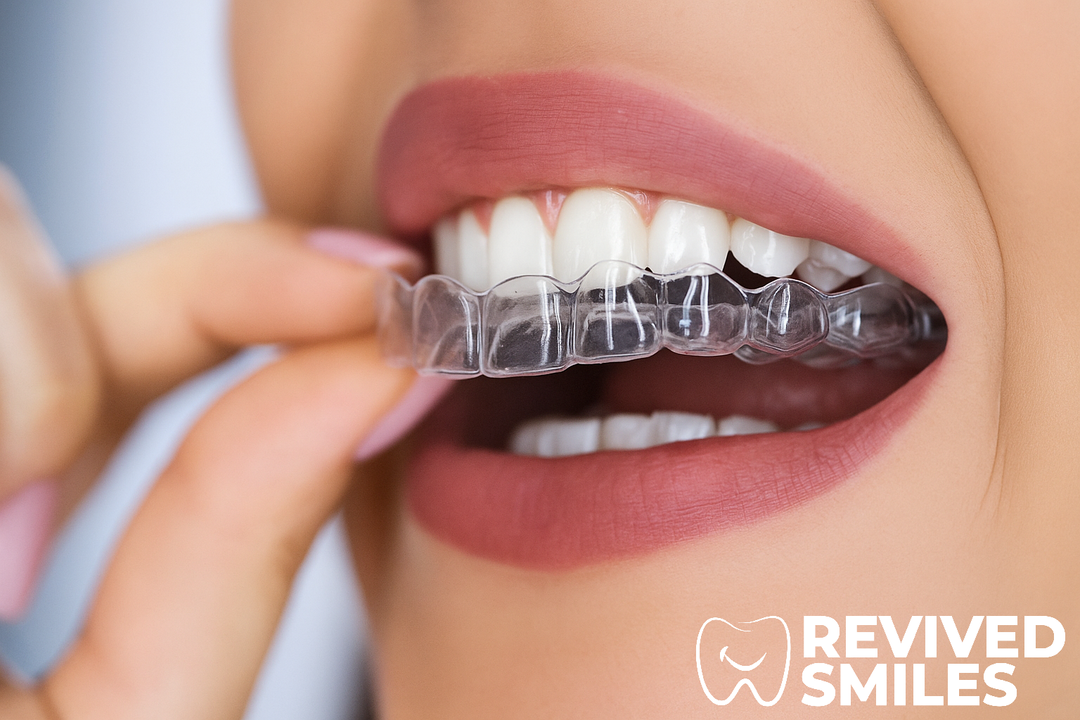How to Know If Your Dentures Don’t Fit Right

A great smile should feel as good as it looks. When dentures fit correctly, they blend seamlessly into daily life, and you eat, speak, and laugh without giving them a second thought. But when something feels off, even small issues can become big frustrations.
At Revived Smiles, we’ve seen how much difference the right fit can make. Your dentures should never cause pain, slip while talking, or make chewing a chore. Let’s walk through how to know if your dentures don’t fit right, what symptoms to watch for, and the best solutions to restore comfort and confidence.
Why Proper Fit Matters
Dentures are more than just a cosmetic fix for missing teeth. They restore essential functions like chewing and speaking, while helping to support your facial structure. A comfortable, secure fit allows you to enjoy your favorite meals and feel confident in every conversation.
But when you wear dentures that no longer fit properly, problems can add up fast. Gum irritation, sore gums, and constant discomfort are only the beginning. Over time, loose dentures can irritate the gums, create sores, and even lead to oral infections if left untreated.
A healthy smile isn’t just about looks; it’s about oral health, function, and confidence. The sooner you recognize the signs of ill-fitting dentures, the easier it is to get professional advice and treatment that works.
Physical Signs of Poorly Fitting Dentures
Your gums are often the first place to show when something’s wrong. Poorly fitting dentures can irritate soft tissue, cause swelling, or even create sores that make eating and speaking painful.
Gum Irritation and Sore Spots
If you notice tender areas or denture sores on your gums, it could be from uneven pressure or friction. When pressure isn’t distributed evenly, the constant rubbing can lead to soreness and inflammation. These symptoms often appear when dentures loosen or shift slightly out of place.
Redness or Swelling
Red, inflamed gums or swelling can develop as dentures stop fitting properly. This means more pressure is being applied in some areas than others, making it hard to wear dentures comfortably throughout the day.
Slipping or Shifting While Talking or Eating
If your dentures slip or shift while you talk or eat, they’re not fitting properly. Loose dentures may move out of place, irritate the cheeks, or interfere with your speech. You shouldn’t have to worry about your dentures slipping or making you self-conscious every time you laugh or bite into food.
Clicking Noises
Clicking or popping sounds while speaking or chewing often mean your dentures are loose. These noises happen when the dentures don’t seal against your gums correctly, allowing them to move around inside your mouth.
Recognizing these early signs can prevent discomfort, pain, and oral health complications from developing further.
Functional Signs of Poorly Fitting Dentures
A poor fit doesn’t just affect comfort; it changes how your dentures perform day to day.
Difficulty Chewing with Dentures
If you’re having difficulty chewing food that was once easy to eat, your dentures may not be aligned properly. When dentures loosen, you might avoid certain foods altogether. This uneven pressure can irritate your gums and lead to sore spots or even infection if not corrected.
Changes in Speech
It’s common to notice changes in speech when dentures don’t fit correctly. If you find it harder to talk clearly or develop a lisp, your dentures may be moving or sitting too high or low in your mouth.
Food Getting Stuck Underneath
Food particles getting trapped beneath dentures are a common symptom of poor fit. This allows bacteria to thrive, which can lead to gum irritation or infections. Properly fitting dentures create a secure seal that prevents this from happening.
Pain and Discomfort Due to Poorly Fitting Dentures
Dentures should never cause pain. Persistent discomfort means something is wrong.
Constant Soreness or Raw Spots
Raw spots or sore gums can occur when dentures apply uneven pressure. Over time, this can make it painful to wear dentures for long periods, causing difficulty eating or speaking.
Uneven Pressure and Pain When Biting
If you feel more pressure on one side when biting, your dentures aren’t distributed evenly across your gums. This can cause headaches, jaw stiffness, and soreness in your cheeks or tongue. Ill-fitting dentures often require adjustments to resolve these painful pressure points.
Jaw or Facial Pain
A misaligned denture can strain the jaw and muscles around your mouth, leading to discomfort or fatigue. If this pressure becomes constant, you may even start experiencing pain when you wake up or when you try to eat tougher foods.
Pain and discomfort are not normal signs of wearing dentures; they’re clear signals that it’s time to see your dentist for professional advice.
Changes Over Time
Even well fitting dentures can become loose as your mouth changes.
Natural Gum and Bone Shrinkage
After tooth loss, your gums and bone gradually shrink in a process known as resorption. This means that dentures that once fit correctly may no longer match the shape of your mouth. Over time, you may notice they slip more or cause irritation.
Dentures Feeling Looser Than Before
If your dentures feel loose or you find yourself using more adhesive, it’s time for a checkup. Loose dentures are a sign your gums have changed shape. They can irritate soft tissue, cause denture sores, and make it difficult to maintain proper oral hygiene through brushing and cleaning.
Why Adjustments or Relines Are Necessary
A denture reline can reshape the base to fit your gums again. It’s a simple, effective treatment that restores comfort and prevents further irritation. If your dentures are old or damaged, however, a new pair may be the best long-term solution. Revived Smiles recommends regular checkups to ensure your dentures continue fitting properly as your mouth changes.
When It’s More Than Just Fit

Sometimes, poorly fitting dentures lead to more serious complications.
Signs of Infection
If you notice swelling, redness, or a burning sensation under your dentures, it could be a fungal or bacterial infection. Oral infections can develop when dentures slip or trap food particles and moisture against your gums.
Persistent Sores That Don’t Heal
Sores that don’t heal within a few days should be examined by a dentist. Long-term irritation can lead to infections or tissue damage. Regular cleaning and proper fitting dentures reduce these risks significantly.
When to See a Dentist Urgently
If you experience persistent pain, discoloration, or swelling in your gums or cheeks, schedule an appointment right away. Early diagnosis and professional treatment can resolve the issue quickly and prevent more serious oral health complications.
Solutions and Next Steps
The good news? Most denture fit problems are fixable with professional help.
Professional Adjustments and Relines
Your dentist can adjust or reline your dentures so pressure is distributed evenly across your gums. This relieves sore spots and restores stability. Relines are especially useful for denture wearers who have experienced bone shrinkage or gum changes.
When Replacement May Be Necessary
If your dentures are worn, cracked, or have been repaired multiple times, a replacement may be the best option. New dentures fit better, look more natural, and help prevent further irritation or infection.
Why DIY Kits Aren’t Safe
While it might be tempting to repair or adjust your dentures at home, DIY kits often cause more damage than good. They can interfere with how your dentures fit and lead to more pressure on certain areas of the gums. Always seek professional advice instead of quick fixes.
Importance of Regular Dental Checkups
Routine appointments ensure your dentures continue fitting properly and help prevent oral infections or soreness. Your dentist can identify minor problems before they develop into major ones and guide you toward the right treatment.
FAQs
What are the most common signs that my dentures don’t fit right?
Sore gums, slipping dentures, redness, and difficulty chewing are the most common signs of ill-fitting dentures.
Why do my dentures hurt my gums?
Uneven pressure or rubbing can irritate your gums and cause sores. Properly fitted dentures and regular dental visits can correct these issues.
How should properly fitting dentures feel?
They should feel secure, comfortable, and natural. You should be able to talk, eat, and laugh without worry.
Can ill-fitting dentures cause mouth sores?
Yes. Constant friction can cause denture sores that become painful if not treated promptly.
What should I do if my dentures keep slipping?
Loose dentures require professional adjustment or a reline. Avoid excessive adhesives; they’re only a temporary fix.
How often should dentures be adjusted or relined?
Typically, every one to two years. Regular checkups will help your dentist know when adjustments are necessary.
Do upper and lower dentures have different fit issues?
Yes. Upper dentures rely on suction; lower dentures depend more on your jaw shape and tongue movement.
Is it normal for dentures to feel loose over time?
Yes, as your gums and bone shrink naturally, dentures can loosen. Regular maintenance helps resolve this.
Can poorly fitting dentures affect my health?
Absolutely. They can cause infections, gum irritation, and digestive issues from difficulty chewing food properly.
What’s the difference between a reline and a replacement?
A reline reshapes the inner base to fit correctly, while a replacement involves creating a new pair entirely.
Final Thoughts: Comfort You Can Count On
Knowing how to know if your dentures don’t fit right helps protect your oral health and comfort. Loose dentures, gum irritation, and denture sores shouldn’t interfere with your life; they’re signs it’s time for professional care.
Whether you need a denture reline, repair, or a new pair, Revived Smiles can help you restore confidence and comfort. With properly fitting dentures, you can eat, talk, and laugh freely again. A great smile doesn’t just look good, it feels natural and pain-free.





Dejar un comentario